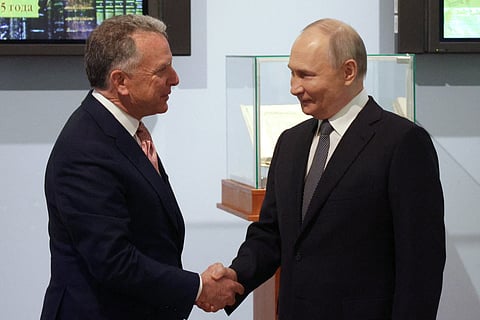Trump envoy Witkoff meets Putin ahead of Russia-Ukraine peace deadline
US president has expressed increasing frustration over Russia’s strikes on Ukraine

Russian President Vladimir Putin held talks with US President Donald Trump’s special envoy Steve Witkoff in Moscow on Wednesday, the Kremlin said, days before the White House’s deadline for Russia to reach a peace deal with Ukraine or potentially face severe economic penalties that could also hit countries buying its oil.
The Kremlin did not immediately provide more details of the meeting. Earlier, Witkoff took an early morning stroll through Zaryadye Park, a stone’s throw from the Kremlin, with Kirill Dmitriev, the Russian president’s envoy for investment and economic cooperation, footage aired by TASS showed.
Dmitriev played a key role in three rounds of direct talks between delegations from Russia and Ukraine in Istanbul in recent months, as well as discussions between Russian and US officials. The negotiations made no progress on ending the three-year war following Russia’s invasion of its neighbour.
Trump’s deadline for Putin ends on Friday. Washington has threatened “severe tariffs” and other economic penalties if the killing doesn’t stop.
Trump has expressed increasing frustration with Putin over Russia’s escalating strikes on civilian areas of Ukraine, intended to erode morale and public appetite for the war. The intensified attacks have occurred even as Trump has urged the Russian leader in recent months to relent.
Overnight attacks
Overnight from Tuesday to Wednesday, Russian forces hit a recreational centre in Ukraine’s southern Zaporizhzhia region, killing two people and injuring 12, including two children, regional Gov. Ivan Fedorov said Wednesday.
Russian forces launched at least four strikes on the area and initially attacked with powerful glide bombs.
“There is zero military sense in this strike. Only cruelty to intimidate,” Ukrainian President Volodymyr Zelenskyy said in a post on Telegram.
Russia also struck the Ukrainian power grid and heating gas facilities, Zelenskyy said, as Ukraine makes preparations for winter.
Western analysts and Ukrainian officials say Putin is stalling for time and avoiding serious negotiations while Russian forces push to capture more Ukraine land. A Russian offensive that started in the spring and is expected to continue through the fall is advancing faster than last year’s push but is making only slow and costly gains and has been unable to take any major cities.
The situation on the front line is critical for Ukrainian forces but defences are not about to collapse, analysts say.
On Tuesday, Trump said “we’ll see what happens” regarding his threat to slap tariffs on nations that buy Russian oil, which could increase import taxes dramatically on China and India.
“We have a meeting with Russia tomorrow,” Trump said. “We’re going to see what happens. We’ll make that determination at that time.”
The president said that he has not publicly committed to a specific tariff rate.
Diplomatic pressure
Stepping up diplomatic and economic pressure on the Kremlin risks stoking international tensions amid worsening Russia-US relations.
The Washington-based Centre for European Policy Analysis warned in an assessment this week that there are “clear signs that the Kremlin is preparing for a broader confrontation with NATO,” including a military build-up along Russia’s western flank with alliance countries in recent years.
Putin has strengthened Russia’s military ties with China, North Korea and Iran. NATO, meanwhile, said Tuesday it has started coordinating regular deliveries of large Western weapons packages to Ukraine. European allies and Canada are buying most of the equipment they plan to transport from the United States. The Trump administration is not donating any arms to Ukraine.
Putin has given no hint that he might be ready to make concessions. Instead, the Russian leader and senior Kremlin officials have talked up the country’s military strength.
Putin announced last week that Russia’s new hypersonic missile, which he says cannot be intercepted by current NATO air defence systems, has entered service.
Former Russian President Dmitry Medvedev, meantime, warned that the Ukraine war could bring Russia and the US into armed conflict. Trump responded to that by ordering the repositioning of two US nuclear submarines.
Kremlin spokesman Dmitry Peskov on Monday welcomed Witkoff’s visit. “We consider (talks with Witkoff) important, substantive and very useful,” he said.
Trump initially gave Moscow a 50-day deadline, but later moved up his ultimatum as the Kremlin continued to bomb Ukrainian cities.
Sign up for the Daily Briefing
Get the latest news and updates straight to your inbox



